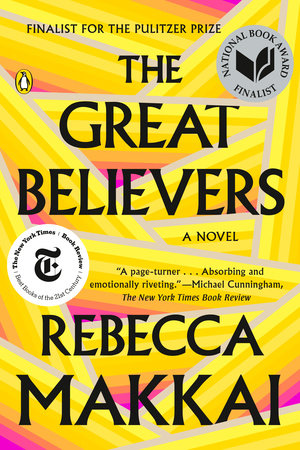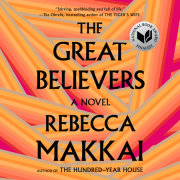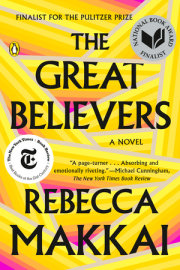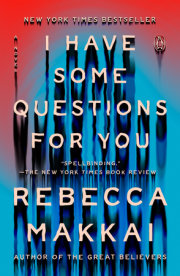1985 Twenty miles from here, twenty miles north, the funeral mass was starting. Yale checked his watch as they walked up Belden. He said to Charlie, “How empty do you think that church is?” Charlie said, “Let’s not care.”
The closer they got to Richard’s house, the more friends they spotted heading the same way. Some were dressed nicely, as if this were the funeral itself; others wore jeans, leather jackets. It must only be relatives up at the church, the parents’ friends, the priest. If there were sandwiches laid out in some reception room, most were going to waste.
Yale found the bulletin from last night’s vigil in his pocket and folded it into something resembling the cootie catchers his childhood friends used to make on buses—the ones that told your fortune (“Famous!” or “Murdered!”) when you opened a flap. This one had no flaps, but each quadrant bore words, some upside down, all truncated by the folds: “Father George H. Whitb”; “beloved son, brother, rest in”; “All things bright and”; “lieu of flowers, donatio.” All of which, Yale supposed, did tell Nico’s fortune. Nico had been bright and beautiful. Flowers would do no good.
The houses on this street were tall, ornate. Pumpkins still out on every stoop but few carved faces—artful arrangements, rather, of gourds and Indian corn. Wrought iron fences, swinging gates. When they turned onto the walkway to Richard’s (a noble brownstone sharing walls with noble neighbors), Charlie whispered: “His wife decorated the place. When he was married. In ’72.” Yale laughed at the worst possible moment, just as they passed a gravely smiling Richard holding open his own door. It was the idea of Richard living a hetero life in Lincoln Park with some decoratively inclined woman. Yale’s image of it was slapstick: Richard stuffing a man into the closet when his wife dashed back for her Chanel clutch.
Yale pulled himself together and turned back to Richard. He said, “You have a beautiful place.” A wave of people came up behind them, pushing Yale and Charlie into the living room.
Inside, the decor didn’t scream 1972 so much as 1872: chintz sofas, velvety chairs with carved arms, oriental rugs. Yale felt Charlie squeeze his hand as they dove into the crowd.
Nico had made it clear there was to be a party. “If I get to hang out as a ghost, you think I wanna see sobbing? I’ll haunt you. You sit there crying, I’ll throw a lamp across the room, okay? I’ll shove a poker up your ass, and not in a good way.” If he’d died just two days ago, they wouldn’t have had it in them to follow through. But Nico died three weeks back, and the family delayed the vigil and funeral until his grandfather, the one no one had seen in twenty years, could fly in from Havana. Nico’s mother was the product of a brief, pre-Castro marriage between a diplomat’s daughter and a Cuban musician—and now this ancient Cuban man was crucial to the funeral planning, while Nico’s lover of three years wasn’t even welcome at the church tonight. Yale couldn’t think about it or he’d fume, which wasn’t what Nico wanted.
In any case, they’d spent three weeks mourning and now Richard’s house brimmed with forced festivity. There were Julian and Teddy, for instance, waving down from the second-story railing that encircled the room. Another floor rose above that, and an elaborate round skylight presided over the whole space. It was more of a cathedral than the church had been. Someone shrieked with laughter far too close to Yale’s ear.
Charlie said, “I believe we’re meant to have a good time.” Charlie’s British accent, Yale was convinced, emerged more in sarcasm.
Yale said, “I’m waiting on the go-go dancers.”
Richard had a piano, and someone was playing “Fly Me to the Moon.” What the hell were they all doing?
A skinny man Yale had never seen before bear-hugged Charlie. An out-of-towner, he guessed, someone who’d lived here but moved away before Yale came on the scene. Charlie said, “How in hell did you get younger?” Yale waited to be introduced, but the man was telling an urgent story now about someone else Yale didn’t know. Charlie was the hub of a lot of wheels.
A voice in Yale’s ear: “We’re drinking Cuba libres.” It was Fiona, Nico’s little sister, and Yale turned to hug her, to smell her lemony hair. “Isn’t it ridiculous?” Nico had been proud of the Cuban thing, but if he knew the chaos his grandfather’s arrival would cause, he’d have vetoed the beverage choice.
Fiona had told them all, last night, that she wasn’t going to the funeral—that she’d be here instead—but still it was jarring to see her, to know she’d followed through. But then she’d written off her family as thoroughly as they’d written Nico off in the years before his illness. (Until, in his last days, they’d claimed him, insisting he die in the suburbs in an ill-equipped hospital with nice wallpaper.) Her mascara was smudged. She had discarded her shoes, but wobbled as if she still wore heels.
Fiona handed her own drink to Yale—half full, an arc of pink on the rim. She touched a finger to the cleft of his upper lip. “I still can’t believe you shaved it off. I mean, it looks good. You look sort of—”
“Straighter.”
She laughed, and then she said, “Oh. Oh! They’re not making you, are they? At Northwestern?” Fiona had one of the best faces for concern Yale had ever seen—her eyebrows hurried together, her lips vanished straight into her mouth—but he wondered how she had any emotion left to spare.
He said, “No. It’s—I mean, I’m the development guy. I’m talking to a lot of older alumni.”
“To get money?”
“Money and art. It’s a strange dance.” Yale had taken the job at Northwestern’s new Brigg Gallery in August, the same week Nico got sick, and he still wasn’t sure where his responsibilities started and ended. “I mean, they know about Charlie. My colleagues do. It’s fine. It’s a gallery, not a bank.” He tasted the Cuba libre. Inappropriate for the third of November, but then the afternoon was unseasonably warm, and this was exactly what he needed. The soda might even wake him up.
“You had a real Tom Selleck thing going. I hate when blond men grow a mustache; it’s peach fuzz. Dark-haired guys, though, that’s my favorite. You should’ve kept it! But it’s okay, because now you look like Luke Duke. In a good way. No, like Patrick Duffy!” Yale couldn’t laugh, and Fiona tilted her head to look at him seriously.
He felt like sobbing into her hair, but he didn’t. He’d been cultivating numbness all day, hanging onto it like a rope. If this were three weeks ago, they could have simply cried together. But everything had scabbed over, and now there was this idea of party on top of everything else, this imperative to be, somehow, okay. Merry.
And what had Nico been to Yale? Just a good friend. Not family, not a lover. Nico was, in fact, the first real friend Yale had made when he moved here, the first he’d sat down with just to talk, and not at a bar, not shouting over music. Yale had adored Nico’s drawings, would take him out for pancakes and help him study for his GED and tell him he was talented. Charlie wasn’t interested in art and neither was Nico’s lover, Terrence, and so Yale would take Nico to gallery shows and art talks, introduce him to artists. Still: If Nico’s little sister was holding it together this well, wasn’t Yale obliged to be in better shape?
Fiona said, “It’s hard for everyone.”
Copyright © 2018 by Rebecca Makkai. All rights reserved. No part of this excerpt may be reproduced or reprinted without permission in writing from the publisher.











